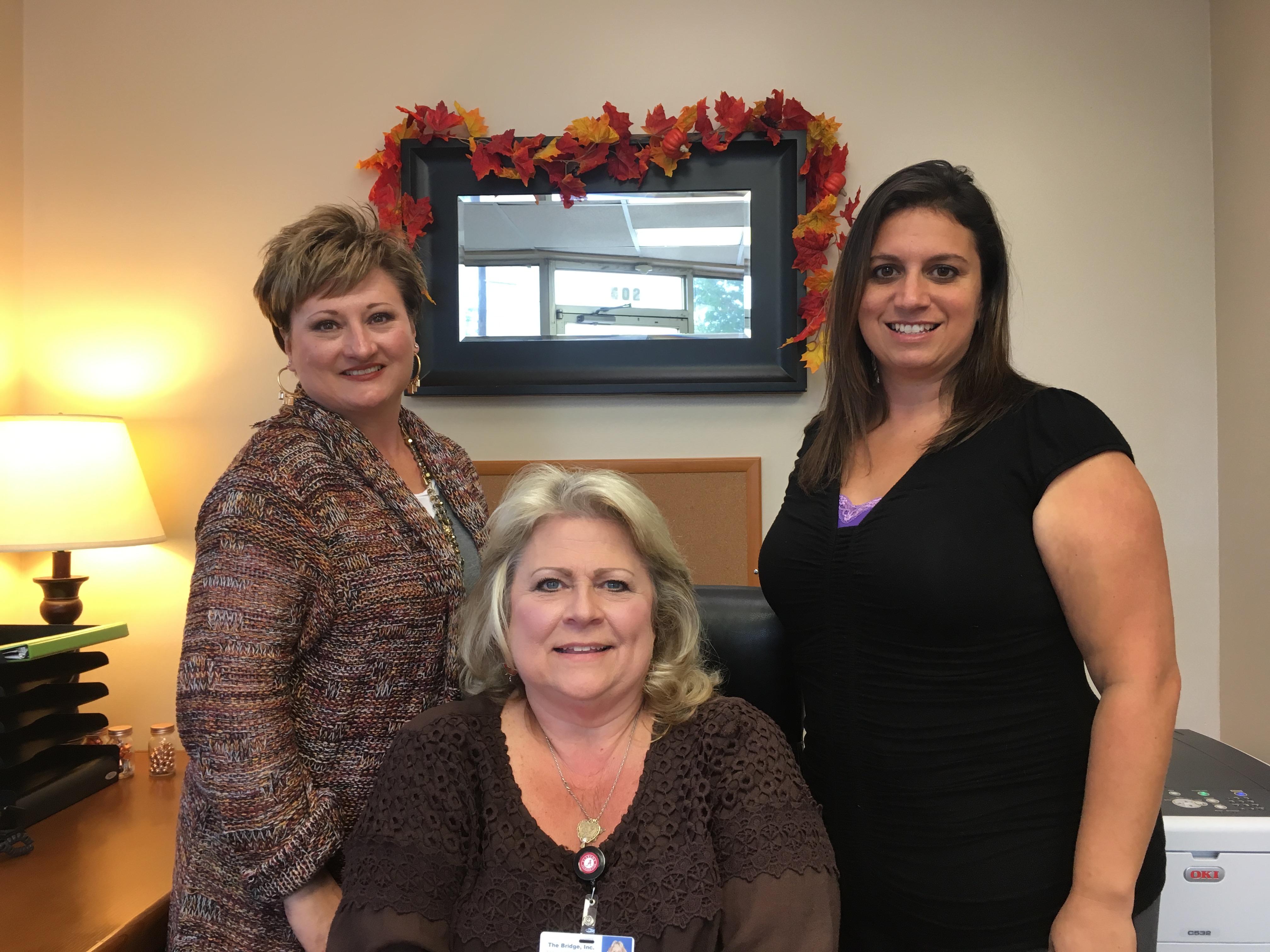L-R: Lisa Burgess, Program Manager Grace Potter, Angela Shadden / W.C. Mann
CULLMAN – Tucked away in an inconspicuous corner of Cullman is a little office, full of people, with a big mission. The Bridge Cullman is an outpatient addiction treatment center that provides therapy and support for adolescents ages 12 to 18 diagnosed with chemical abuse or dependency, and for their families. Cullman is home to one of several outpatient centers for the Gadsden-based provider, which also offers residential services at facilities around the state.
The Bridge takes kids through self or parental referrals, as well as referrals from physicians, hospitals, mental health centers, judges, juvenile probation officers and others. The staff has working partnerships with the Cullman County Family Court, Juvenile Probation Office, Department of Human Resources, and both city and county school systems.
Kids entering the program are given an initial placement assessment that helps the staff create an individualized approach to treatment. That treatment can take the form of group, individual and family therapy, as well as the development of coping strategies and relapse prevention skills. The qualified staff can also perform psychological assessments, and performs drug screens on participants. When necessary, they can refer kids to other services, and will even help older youth with career and education planning.
Once in the program, kids can be involved in activities at The Bridge from 90 days to more than a year, depending on the particular student’s needs. Around 90 percent of those who enroll in the program successfully graduate.
The Tribune sat down with Cullman’s Program Manager Grace Potter, and therapists Lisa Burgess and Angela Shadden to find out more.
The kids
The “typical” Bridge youth client is around 15 to 16 years of age, and routinely uses marijuana along with at least one other substance like alcohol, methamphetamine or prescription drugs, or even heroin (the second most common drug used by The Bridge’s teen clients).
“In high school,” said Burgess, “it used to be a big thing to steal your dad’s cigarettes and smoke them at school. Now, the tobacco’s nothing. Now, it’s marijuana.”
Many come from single parent families; too many have backgrounds of neglect or abuse. Most come to The Bridge by way of court referral after they’ve been arrested. Only about 10 percent will enroll in time for the staff to try and prevent run-ins with the law.
Potter said, “A lot of these kids are sexually abused or physically abused; they’re neglected. We’ve got girls in here that have been raped because of drugs. We’ve got young boys here that have been severely beaten and tortured by stepfathers, and the stories would just make you cringe.
“And these kids are here. They’re our kids; this is our community, our children. Every single one of them came from this community. They go to all these schools.
“Half our kids here have been suicidal or had suicidal ideations. They’re cutters. These kids are not just your typical, normal child that woke up one morning and started using drugs or alcohol. That’s why we call it the family disease.
“When I counseled in the jail, I saw over a hundred inmates over there. They were murderers, rapists, baby killers; you name it: the federal inmates, the crazies. One thing I realized: every single one of those–and I’m not defending them–but every single one of them had a story to tell about their childhood.”
All three staffers agreed that, in their experience, kids get most of their abusable substances from a source within their families: beer in the refrigerator, liquor in the cabinet or unsecured prescriptions in the medicine cabinet. In some cases, especially with alcohol and marijuana, relatives in the immediate or extended family intentionally supply the youth.
Potter went on to describe kids who have suffered horrific treatment at the hands of family members, and kids who consistently arrive at the Bridge office hungry, because they do not have enough to eat at home. Through donated groceries, the staff often feeds its clients, and they participated in the federally-funded summer feeding program at West Elementary School last summer.
“We don’t want any kid to come here and be hungry,” said Potter. “Even though we’re not in that business to feed them, we’ve made it our business. We keep chips and snacks back there for them, cookies, peanut butter and jelly. We make sure water is here. Occasionally, we’ll do pizza out of our own pocket; of course, that makes their night!”
Not a child problem, but a family problem
Potter explained how The Bridge equips families to help their kids:
“We just started this Family Recovery. The judge is even ordering parents to come to this, if they have a child here. And the reason we have it every Monday from 5 to 6, without the kids–it’s just for the parents–they have to understand: it’s a family disease, and they need to be aware of what’s going on with their child every single minute.
“If your child comes home from school, and they’re making Fs, something’s wrong, especially if they’re capable of making good grades. But parents don’t want to face that issue. We’ve had them tell us, ‘Our kids don’t use drugs.’”
Burgess added, “It’s very despairing for me when the parents are using drugs, or possibly incarcerated, and now they’re having issues with their kids. And it’s like they’re going to bring them here for 20 minutes, and we’re going to fix everything in 20 minutes.”
The Bridge’s staff faces occasional discouragement from parents who choose to withdraw their kids from the program early, often because their kids have begun to show improvement and the parents no longer wish to be inconvenienced by the extensive time commitment involved. In the case of court referrals, early withdrawal from the program is not an option. The 10 percent who do not graduate come from those who voluntarily enrolled, or were enrolled by their parents.
Keeping kids out of jail
“These kids,” said Potter, “we don’t want them to wind up in the detention center, the Cullman County jail. I don’t. I don’t want our kids going there, but, unfortunately, that’s where some of our kids have gone.”
Shadden shared, “We provide them with coping skills, learning boundaries and when to say no and how to say no. We do a relapse prevention plan, so they don’t relapse. We talk to them about protective factors, like being in the right social support, and also making sure that they have a sense of purpose.”
Looking for resources
Potter and her staff take every opportunity to network with others in the area, taking part in community events such as the Cullman County Fair and Relay for Life, and The Bridge also networks actively with a number of area and regional entities for everything from food to assistance with fundraising, from guest speakers to program referrals, and all-important volunteers. The list includes, among many others:
- Cullman Area Mental Health Authority/Mental Healthcare of Cullman
- Northwest Alabama Mental Health Center START Program
- Cullman County Sheriff’s Office and Sheriff Matt Gentry
- Cullman County Department of Human Resources
- County judges: Kim Chaney, Rusty Turner
- Wallace State Community College
- Juvenile probation officers
- Recovering Women’s Outreach
- Cullman County Schools
- CCBOE Cullman Area Resource Education Counselor Scott Carpenter
- Good Hope High School Assistant Principal Amy Speegle
- Holly Pond High School Counselor Karen Rowell
- West Elementary School
- Turnaround Counseling
- Tyson Foods
- Panera Bread
- Cracker Barrel
- The Link of Cullman County
- Local ministers
Potter said, “We’re nonprofit, so we try and get as much help as we can here, but people don’t know about us. The community’s just not aware, or they don’t want to talk about it.”
How you can help
As a nonprofit, The Bridge lives on donations, especially for those things it supplies to its kids. As the Thanksgiving and Christmas season approaches, people who want to help the organization can do so by doing something special for the kids. Ideas that were presented to The Tribune included:
- Food cards for kids to purchase food at a local grocery store and take home with them
- Gift cards for kids to have a little spending money before Christmas
- Holiday meals
- Pizza parties
- Surprise Christmas stockings stuffed with little treats
- Clothing and shoes
- Coats, sweaters and jackets – many kids don’t have one
- Small Christmas trees and decorations – some kids won’t have one in their home, otherwise
- Snack food items, water and sodas except energy/sports drinks
The Bridge has vehicles available, and can pick up some bulkier items like Christmas trees.
For parents who are worried about their kids
If parents are concerned about changes in their children’s behavior, The Bridge offers free diagnostic services.
According to Potter, “It’s nonprofit, absolutely no cost. If you have a child that you think is dabbling in drugs, why wouldn’t you want them to come here, just for the assessment, just for a drug screen, just to be sure?
“It’s a 30-page state assessment. It’s not just getting the substance abuse; we’re touching the mental health areas and the abuse, so we’re going to know a lot about this kid when they leave here. Who wouldn’t want to know that about their child?”
To find out more about The Bridge, visit www.bridgeinc.org. To seek or offer help at the Cullman office, visit them at 402 Arnold St. NE, where they occupy a suite in the same building as Cullman Caring for Kids, or call 256-775-8301, ext. 700.
Copyright 2017 Humble Roots, LLC. All Rights Reserved.


























